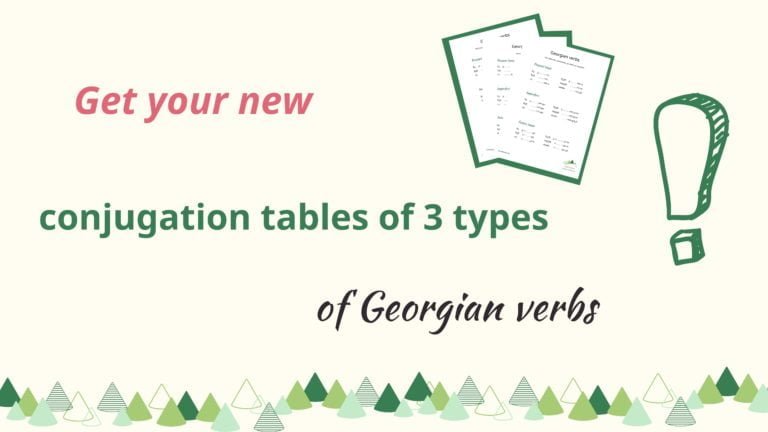How to build future tense in Georgian? It’s pretty simple rule. From this article you’ll learn how to build it for one type of verbs like „to live”, „to work” and „to think”.
When one can use future tense in Georgian?
Let’s begin with some basic information about the future tense itself as with this article we start a series about conjugation in this tense. To make it as simple as possible, you may assume it’s almost the same as in English. Therefore, whenever you want to say about something happening next week, tomorrow or in 2 years, future tense is your friend.
For the Georgian future tense introduction I have chosen 3 verbs which conjugate same way and represent the simplest conjugation group. This is one way of learning Georgian verbs (which are not as complex as the rumors have it). Remember several types of conjugations and when learning new verb, try to connect it with the group you already know. As a result, you’ll remember them for much longer.
How to conjugate to work and think in future tense?
Using those 2 verbs as examples, I’ll show you how simple the future forms are (for this type of verbs of course). Use the present tense form of the verb as your starting point. Now add letter „ი” before the root of the verb and change „-ობ“ into „-ებ”. That’s it. What’s left is to practice pronunciation, because by now you’ll have already a habit of ending those verbs with „-ობ“. It’s because you used it a lot in the present tense. Therefore the whole scheme for the 1st person singular looks as follows:
Based on it let’s see how the verb to live (ცხოვრება) looks like in future:
მე ვიცხოვრებ
შენ იცხოვრებ
ის იცხოვრებს
ჩვენ ვიცხოვრებთ
თქვენ იცხოვრებთ
ისინი იცხოვრებენ
Quite simple, isn’t it? The time has come to get acquainted with the verb to think (ფიქრი):
მე ვიფიქრებ
შენ იფიქრებ
ის იფიქრებს
ჩვენ ვიფიქრებთ
თქვენ იფიქრებთ
ისინი იფიქრებენ
How does the verb to work conjugates in future?
In this case it’s same, but a bit different 😉. To be more precise, the above scheme is perfectly the same. What is being added is the letter –ვ– between the verb root and the particle –ებ. It’s because there are letters ა and ე next to each other.
Therefore, the conjugated verb would look as follows:
მე ვიმუშავებ
შენ იმუშავებ
ის იმუშავებს
ჩვენ ვიმუშავებთ
თქვენ იმუშავებთ
ისინი იმუშავებენ
You may compare this with „to work” conjugated in the imperfect tense.
How to study Georgian verbs?
What is left for you today those are two things. Firstly, think which other verbs do you know that conjugate in present and imperfect similarly to the ones mentioned above. Write them down and conjugate them. Secondly, build sentences with them on a regular basis. Use them when speaking or writing and repeat, repeat, even without sentences.
Do you know which other verbs conjugate similarly? Let us know in the comments! Write them even if you’re not perfectly sure. Thanks to this we’ll be able to verify those for you, so you’ll gain new knowledge in Georgian language!

